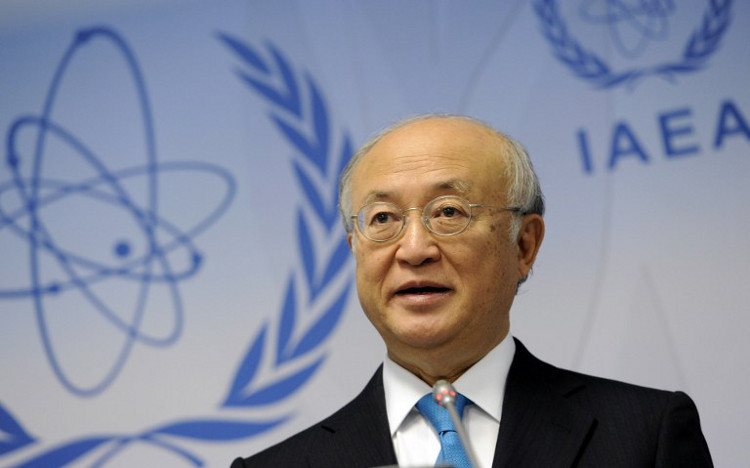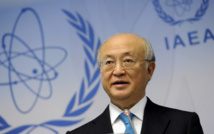"We will continue the cooperation with the international nuclear agency also in this new phase and will not limit access of IAEA inspectors to our facilities," Kamalvandi said.
The International Atomic Energy Agency (IAEA) is monitoring the latest developments related to Iran's centrifuge research and development, the Vienna-based agency's spokesman Fredrik Dahl said Saturday.
"Agency inspectors are on the ground in Iran and they will report any relevant activities to IAEA headquarters in Vienna," he said.
Acting IAEA chief Cornel Feruta was to arrive in Tehran later Saturday and will meet high-level officials in Iran to discuss its plans on Sunday.
Kamalvandi said the new centrifuges would allow Iran to speed up the process of enriching uranium to a purity level of 20 per cent and beyond, but he did not say if there were immediate plans to do so.
Uranium needs to be enriched to 90 per cent for a nuclear weapon to be built, but getting from 20 to 90 per cent is considered to be a relatively quick process.
Kamalvandi warned that the next stage in Iran's exit from the nuclear deal would come in November - and that it may amount to the complete abandonment of the agreement - unless Europe takes stronger action to shield Iran's economy from US sanctions.
"Especially for the European signatories, then, there is little time to save the deal," he said.
The 2015 nuclear deal placed strict limits on Iran's uranium production in return for easing economic sanctions, but the United States pulled out of the agreement in 2018 under President Donald Trump.
European allies who opposed the US withdrawal have tried to help Iran circumvent US sanctions and keep the deal alive, but Iran says these efforts have had limited impact.
"It is time for Europeans to stop ... failing to fulfil their obligations and to fulfil the commitments they have made," Iranian Foreign Minister Mohammad Javad Zarif said Friday in comments carried by state news agency IRNA.
Iranian President Hassan Rowhani had said this week that the AEOI agency would have everything it needs to expand Iran's nuclear programme "without limits."
But observers suggest Iran could be using Saturday's announcement to step up the pressure on global powers to do more to protect the nuclear deal.
An annual gathering of world leaders for the UN General Assembly in New York later this month, which is also to include Rowhani, could see a summit of the remaining treaty partners - Russia, China, France, Britain and Germany. Trump's participation is considered unlikely but has not been ruled out.
The US withdrawal from the deal and reimposing of stiff sanctions has been part of a "maximum pressure" campaign to secure a broader deal that goes beyond nuclear issues and discusses Iran's ballistic missile programme and role in regional conflicts.
US Defence Secretary Mark Esper said the US was not surprised by Iran's announcement on Saturday: "It's no surprise that the Iranians are going to pursue what the Iranians always intended to pursue," he said at a news conference in Paris, standing alongside his French counterpart Florence Parly.
Parly said France would do everything in its power to save the nuclear agreement that the US withdrew from last year.
US National Security Advisor John Bolton, an opponent of engaging with Iran, did not mention Saturday's announcement but accused Iran of sending an oil tanker that had been held in Gibraltar to Syria, despite promising the British government it had no such plan.
"Anyone who said the Adrian Darya-1 wasn’t headed to #Syria is in denial. Tehran thinks it’s more important to fund the murderous Assad regime than provide for its own people," Bolton tweeted. "We can talk, but #Iran’s not getting any sanctions relief until it stops lying and spreading terror!"
The 2015 nuclear deal restricted Iran's uranium enrichment to no more than 3.67 per cent purity and its reserves of below that level of purity to no more than 300 kilograms. Iran already broke through both of those limits in its first two withdrawal phases earlier this year.
Iran has said multiple times that even if the Islamic Republic does pull out of the nuclear agreement, the country has no intention of developing nuclear weapons.
-------------------------------------------------------------------------









 Home
Home Politics
Politics











